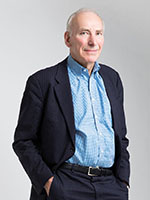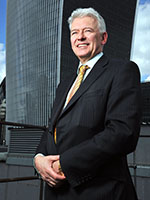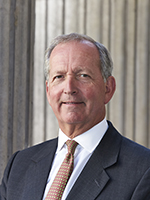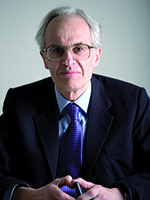 Anthony Hilton FCSI(Hon)
Anthony Hilton FCSI(Hon)A lot has changed in 25 years. Describing the London financial scene back in the 1980s, in the years just before the establishment of the Securities Institute, an American journalist wrote – with perhaps a touch too much flamboyance – that “the sound of the City was the sound of a thousand backs being scratched”. This world vanished with the globalisation of the financial markets. The inward looking, cosy London culture was swamped and, too small to swim alone in the international seas, the cottage industries came together under one roof to form the investment banks which dominate today.
It was only then that bankers, brokers and market makers realised how different they were – in business culture, in motivation and in background. Many were of an age that still believed that an enlightened amateur could turn his hand to anything and they were therefore shocked to discover that a brilliant banker made a lousy broker and an even worse trader. They were derailed further by having to manage the conflicts of interest of acting as agent and principal. The result, inevitably, was a shambles of mistakes, chaos, horrendous losses and occasional bad behaviour.
This brought into focus three new things which have shaped the City ever since: culture, conflicts of interest and complexity. It created a need for a fourth unknown discipline: compliance. But the City also had to learn that regulation was a highly inefficient and ineffective way of raising standards. True professionalism comes from people wanting to better themselves and from firms wanting to employ only the best.
The real story of the past 25 years is that such professionalism is now almost taken for granted across the securities sector. Today, it would be almost inconceivable to have people in responsible roles – client facing or otherwise – who do not hold some professional qualification and commit regularly to various forms of continuing professional development. The firms want it, the clients want it and the regulator demands it, but it really is a major change.
The second shift is in the growth of competition between international jurisdictions and the role of standards and integrity in enhancing the attractiveness of one financial centre over another. In a world where financial products and financial techniques are quickly commoditised, it is the people who make the difference. Again, this was much less overt and apparent a generation ago, but today the export of London values and the appeal of London qualifications, as supplied by the CISI and by Britain’s other professional bodies operating in other financial disciplines, has developed into a huge invisible asset, underpinning the City of London’s soft power across the world.
A brave new world
Coming to terms with this new world is a full-time and never-ending job. There has been a massive upgrading of training and standards of professionalism. Statutory regulators have had to go through several iterations. Each has carried a bigger stick than the last but the search for the right balance between creativity and control remains elusive. The compliance function has followed a similar path. A generation ago nothing was spent on regulation. You could host the Olympics every two years with what the financial services sector now spends.
But the real lesson of recent times is the understanding that if the financial world loses its reputation for probity and integrity, and its basis of trust in society, then life becomes very difficult indeed. The City today understands this in a way that it did not a quarter century ago.
 CISI CEO Simon Culhane, Chartered FCSI
CISI CEO Simon Culhane, Chartered FCSIOn the 25th anniversary of the formation of what was then the Securities Institute, it is worth looking back at the Prospectus under which the Institute was launched in February 1992, to consider whether and to what extent the CISI may be considered to have met the original objectives. As importantly, has the CISI kept pace with changes in the industry and the expectations of the public?
One of the points made in the Prospectus was that while others, particularly APCIMS, now the Wealth Management Association, had assumed the trade association function of the Stock Exchange, there had been no successor to act as a professional body for individual practitioners. The Securities Institute was launched to fill that need. It was intended to cover all securities activities: investment management, corporate finance and the derivatives markets, as well as support operations, compliance and regulatory matters. It was to concern itself particularly with the maintenance of the highest standards of integrity and business ethics throughout the industry, and with the improvement of standards of professional competence through its work in the areas of training and qualifications. So, after 25 years, is the CISI meeting its objectives?
Successful expansion
At the macro level the answer must be a resounding yes. The CISI now has over 40,000 members, including some 20,000 students, in over 116 countries around the world. We have offices in Dubai, India, Singapore and the Philippines, as well as a thriving administration office in Sri Lanka. Last year we hosted almost 40,000 examination candidates in over 80 countries, with the majority sitting computer based examinations, while continuing to offer gold standard narrative exams for wealth managers – and now also for financial planners.
On the industry front, one of our initial backers, the Securities and Futures Authority, saw its responsibilities absorbed into the newly established Financial Services Authority. This ushered in a new era of regulation and examination requirements. Changes in those requirements, resulting from the broader focus of the new regulator, together with the need to have our examinations accepted as meeting recognised national educational criteria, saw the Institute withdraw from the provision of examination training, as conflicting with our status as an ‘awarding body’.
The CISI has become a source of advice and expertise to promote ethical behaviour
One of the earliest areas which saw us combine forces with another body was in the discipline of corporate finance (CF), where we formed a partnership with the Institute of Chartered Accountants in England and Wales to produce the professional level Corporate Finance Qualification and accompanying CF designation. We also were leaders in recognising the growing importance of Islamic finance and, with Lebanese help from the École Supérieure des Affaires, we launched the Islamic Finance Qualification.
The impact of the GFC
Any discussion of the past 25 years cannot fail to mention the global financial crisis (GFC). For the CISI, the most immediate impact was felt in the qualifications area, where a sudden and prolonged hiring freeze meant that the annual surge of graduate recruits into the investment banking field became a trickle and firms became less willing to pay membership fees for their staff as a matter of course.
What accompanied the GFC was a renewed focus on culture, ethics and an explosion in compliance. Although ethics was central to the establishment and purpose of the Institute, its place in people’s minds had tended to become secondary to the aim of making money. However, by late 2004 it was felt that this aspect of the Institute’s mission needed to be more widely broadcast and the
Ethics & Integrity Committee was relaunched to bring greater focus to the Institute’s message. Little did anyone suspect what was coming, but when disaster struck in 2008, the CISI had become established as a source of advice and expertise to promote values, culture, ethical behaviour and professionalism in the industry.
Promotion of professionalism remains central to the mission of the CISI, but the expectations of the public in this regard remain unfulfilled so far as wholesale financial markets are concerned. Despite the work of the Parliamentary Commission on Banking Standards, which led to the establishment of the Lambert Review and subsequently the Banking Standards Board, and repeated recommendations by the CISI that the same expectations and requirements for demonstrable standards of professionalism should be mandated for operators in wholesale markets, as required in retail markets, neither the regulator nor Parliament has been prepared to take that step.
Challenges ahead
In terms of the challenges ahead, not only is it a question of doing what we do, only better, but to keep looking ahead to anticipate changes in financial services sector practice and public expectation of a professional body. In this regard, the establishment of the Banking Standards Board represents both a challenge and an opportunity for the Institute to participate in the direction of policy and the establishment of best practice based on experience of what has worked over the past 25 years and our aims for the next 25. The recent launch of the
Chartered Body Alliance, in partnership with the Chartered Insurance Institute and the Chartered Banker Institute, represents the first step on that road.
 Sir Alan Yarrow Chartered FCSI(Hon), chairman, CISI (2009 – present)
Sir Alan Yarrow Chartered FCSI(Hon), chairman, CISI (2009 – present)In 2009, I was honoured to be asked to be chairman of the Institute, an organisation whose principles I have always believed are critical to rebuilding and maintaining respect for our industry.
I travelled to many countries during my year as Lord Mayor of the City of London (2014–2015) and was always very proud to say that I was also chairman of the CISI. The Institute has a fast-growing international portfolio and is respected for its integrity and as a leading accreditation body in over 40 countries.
I believe the Institute adds real value to the commercial lives of its members, which in turn benefits their clients. This is possible only with the right people working here, committed to professionalism and efficiency. Equally, the Institute couldn’t function without those many members who give their time and experience for the benefit of others. You can’t teach experience, but you can share it, and we believe in providing the right tools to help others to make the right choices.
One thing we will all have experienced over the past 25 years is the ever-changing and advancing technology. The Institute strives constantly to review and revise not only what, but also how, we can keep our membership up to date and relevant. Despite these changes, the fundamental foundations of this institution will always remain the same: professionalism, knowledge, skills and behaviour. A good recipe for success in the past 25 years, which I cannot see changing in the next 25.
 Scott Dobbie CBE FCSI(Hon), former chairman, CISI
Scott Dobbie CBE FCSI(Hon), former chairman, CISIAlthough I had been a member of the Securities Institute, as it was then, since the time of its formation, I had not been involved in its management or direction until appointed chairman early in 2000. Under Graham Ross Russell’s leadership the organisation had quickly established a strong reputation for the quality of its professional education and its work in promoting trust and integrity within the securities business. This strong business and reputational base laid a foundation from which the organisation continued to develop strongly, and by 2009, at the end of my time in the chair, had achieved Chartered status. Since then, progress has continued both physically, in scale and geographical reach, and in stature, as shown by its participation in the recent launch of the Chartered Body Alliance.
To my mind the Institute has thus succeeded in all its specific objectives, but its most significant achievement has been to combine all the specific member services to provide a pathway to achieve professional standing in the field of financial services, something that was not possible 25 years ago. Professional status is principally about two things: knowledge and behaviour. The range of training courses and examinations has increased to help members meet the higher standards of customer advice and service, which the market and regulators now expect. A
Code of Conduct has been developed, backed by appropriate training and examination. Chartered status, backed by ongoing
CPD, gives external stature and credibility to member and Institute alike. All involved should be proud of what has been achieved in 25 years.
 Graham Ross Russell FCSI(Hon), founding chairman, CISI
Graham Ross Russell FCSI(Hon), founding chairman, CISI
The Institute was founded in the wake of Big Bang, which had brought wholesale change to the City: a significant increase in numbers employed; a broadening of the client base and products; increased complexity of instruments; and the dawn of ‘fintech’. Most firms had transformed, often overnight, from partnerships into subsidiaries of major institutions, many of them with overseas headquarters and most of them at a much bigger scale than their predecessors.
I had been deputy chairman of the Stock Exchange, and was honoured to be one of three former council members given the task of setting up the Institute. Our mission was to build a professional organisation that would have real and lasting influence on standards of integrity and professional competence among individual practitioners.
The statistics support the impressive progress that has been made in achieving these original goals. Membership has grown from 4,800 to 40,000; the number of exams taken has increased more than tenfold and continuing professional development is now widely accepted and practised. The early groundwork to expand the work of the Institute to overseas markets has grown impressively and CISI exams are now sat in more than 80 countries.
Measuring growth in standards of integrity is more difficult, but it is clear that the importance that the CISI gives to the maintenance of high standards of integrity continues to be a major influence on City standards in general. This is an area where the influence of the CISI will continue to be of vital importance.
This article was originally published in the Q2 2017 print edition of The Review. The print edition is available to all members who opt in to receive it, except student members. All eligible members who would like to receive future editions in the post should log in to MyCISI, click on My Account/Communications and set their preference to 'Yes'.